
Amanda Trebach, a member of the immigrant rights’ group Unión del Barrio and an ICU nurse, was monitoring ICE operations in the Los Angeles area when she was targeted and arrested herself. Video of the scene shows masked agents in plainclothes forcing her to the ground and briefly kneeling on her head. “They took me into an unmarked vehicle. They did not read me my rights. They didn’t tell me where I was going,” says Trebach, who was detained overnight before being released without charges the following evening after an outpouring of community support. She recounts her experience and explains why she will continue to fight for her immigrant neighbors in the face of the ongoing danger to her community.
Transcript
AMY GOODMAN: This is Democracy Now!, democracynow.org. I’m Amy Goodman.
We go now to Los Angeles, California, where grassroots organizers are challenging some of the most intense federal shows of force in immigration enforcement crackdowns of Trump’s second term. Earlier this month, the community activist, ICU nurse Amanda Trebach was violently arrested while documenting the operations of ICE agents. She’s a member of the group Unión del Barrio. At the time of her arrest, Amanda was participating in a peace patrol outside Terminal Island, a Coast Guard base used by ICE and Customs and Border Protection as a hub for operations in California. Dozens of volunteers have routinely stationed themselves outside Terminal Island to monitor the movement of the federal vehicles streaming in and out of the staging area. Terminal Island was once a thriving Japanese American fishing village that was demolished during World War II, with its residents forcibly sent to internment camps.
Footage of Amanda Trebach’s arrest shows two plainclothes, masked agents pinning her against the pavement as they kneel on her back and head to handcuff her. One of the agents, yes, seen putting his knee on Trebach’s head for a brief moment as a person recording yells, “Get off her head!”
EYEWITNESS 1: Filming you.
EYEWITNESS 2: Get off her head!
AMANDA TREBACH: Get off me!
EYEWITNESS 2: Get off! Your knee is on her [bleep] head!
AMANDA TREBACH: Get off me!
EYEWITNESS 2: Get it off!
AMANDA TREBACH: Get off me!
ICE AGENT 1: Get back. Get back. Get back.
EYEWITNESS 2: Get off her head!
AMANDA TREBACH: Get off me!
ICE AGENT 1: Get back. Get back.
ICE AGENT 2: You better get back.
AMANDA TREBACH: Get off me!
ICE AGENT 1: Get back. Get back.
EYEWITNESS 1: This is public property, sir. This is public property.
EYEWITNESS 2: Streaming live, this is ICE beating her up. They’ve got a knee on her head.
ICE AGENT 1: Scoot back.
EYEWITNESS 2: I am where I need to be: 10 feet. So…
ICE AGENT 2: Can you guys get her in the van?
AMANDA TREBACH: Sir?
EYEWITNESS 2: You OK?
AMANDA TREBACH: Yeah.
AMY GOODMAN: Amanda Trebach is a U.S. citizen. She was forced into an unmarked black van by at least half a dozen unidentified agents. Her release from federal custody came amidst pressure from activists, community protests and the National Nurses United union. Amanda Trebach is joining us now.
Welcome to Democracy Now!, Amanda. I’m glad you’re out. We spoke to your colleague, Ron Gochez, to describe what happened to you —
AMANDA TREBACH: Yeah.
AMY GOODMAN: — before you were speaking. Can you explain exactly —
AMANDA TREBACH: Yeah.
AMY GOODMAN: — why you were there, what you were intending to do as a peace patrol, warning people about the ICE agents, and what they did to you?
AMANDA TREBACH: Yes. Thank you so much for having me on this morning, Amy. I really appreciate the opportunity.
So, myself and other — many other people and groups have been at Terminal Island, which, as you had mentioned, is near the Port of L.A., in San Pedro, near Long Beach, California. We’ve been there legally monitoring the activity of ICE on and — comings and goings off the island, and alerting the community — specifically, the Harbor Area Peace Patrols has been wonderful — and alerting the community not only of the vehicles to look out for, and so they can feel safer, but also what areas are safe in and around the neighborhood, where ICE is not, so people can go to the park, they can go to the grocery store, and feel as though they’re not going to be taken and kidnapped.
So, what we’ve also been doing is we’ve seen these vehicles at Terminal Island, almost every single one of them, out in the L.A. area. It’s small and large raids across the area. We can directly connect them back to Terminal Island and living in our communities, staying in our communities in Long Beach. So, we’re also connecting license plates. These vehicles are either — they have license plates that are not connected to these vehicles. We have indications and photo evidence that the license plates are being changed, as well. And some don’t even have license plates. So, you know, that is something that we’re doing, but also just making sure the community is aware of what is happening, what to look out for, so they can feel a little bit safer, as well.
AMY GOODMAN: So, explain what happened to you. And this wasn’t the first attempt of ICE to arrest you.
AMANDA TREBACH: No. So, we are on public property when we’re there. It’s actually by the Japanese memorial on the civilian side of Terminal Island. So, at one point, I was going on to the island to park, to peacefully monitor and document. I was pulling in to park, and I was blocked in by ICE agents. And actually, I backed up to try to park, and they jumped out of their vehicle. They were masked, and they had their large guns. They pulled them on me. They illegally tried to open my door. Thank goodness it was locked. I did not allow them in. I said, “No.” I backed up, and they then tried to block me in again. And finally, I pulled into the parking spot, and they sped off.
AMY GOODMAN: So, tell us then about — and we’re watching it right now, the video of you being taken, on — what was it? August 8th?
AMANDA TREBACH: Yes, yes. So, we were out on Terminal Island, just like any other day, monitoring to be able to alert the community of vehicles to look out for. And we had, you know, our sign saying this — “Terminal Island is not safe. San Pedro is not safe with ICE agents here.”
And for some reason, they came out in a large convoy that morning, and they, I guess — their tactics have been changing. They’ve been frustrated. The community, you know, is aware, L.A. is aware, what they were doing is illegal. They are kidnapping us. And I say “kidnappers” because they’re not federal agents, many of them. Some of them are not federal agents. They’re vigilantes. We don’t know who they are. They’re masked. They’re not telling us who they are.
So, they came out in a convoy. They jumped out of the vehicle. As you could see, they pinned me to the ground, and they handcuffed me. They took me into an unmarked vehicle. They did not read me my rights. They didn’t tell me where I was going. They shut the vehicle. They drove me to the other side of the noncivilian side of Terminal Island. And basically, they kidnapped me. I didn’t know what was going on. I was there for four hours.
AMY GOODMAN: What about their —
AMANDA TREBACH: All of their kidnapper cars had been —
AMY GOODMAN: — their knee on your head?
AMANDA TREBACH: Yeah, yeah, their knee was on my head. My face was on the concrete. My head was hurting the night that I was in — they took me to the detention center. It was hurting very bad, my shoulder, actually, and my hip, because they pinned me down so hard to the ground. And then, you know, they were very rough with me, violent with me, when they got me into the — after they closed the door of the truck and took me to the other side of Terminal Island.
And I had to wait there for hours and hours without knowing what was happening. Finally, a woman who said she was from Homeland Security, she came. And at that point in time, they had put me in another unmarked vehicle with two masked people, I guess, that were drivers of some sort. And this entire time, the port police, the Port Authority was aware. They saw what was going on. No one tried to assist me. No one tried to help. They see the guns being drawn on me. So, then —
AMY GOODMAN: Can you talk about where you were held, in this last minute, where you were held, the federal facility, the conditions you witnessed there?
AMANDA TREBACH: Sure, sure. So, the water was not good. I was not given any toiletries to speak of. I was told I would have to purchase a cup, you know. And thank goodness, I was — the community came around — the Unión del Barrio, Community Self-Defense Coalition, All Power Free Clinic. You know, we’re not stepping down. That’s why I was freed as a political prisoner, because of the community coming together.
And we know these tactics are escalating. ICE kidnappers are escalating. They’re not following the temporary restraining order that has been carried out by the judge. They’re coming after us. They’re escalating their tactics.
AMY GOODMAN: And the impact, overall —
AMANDA TREBACH: But we’re here. We’re not — we’re growing.
AMY GOODMAN: The impact, overall, Amanda, on the community, and especially the targeted community, undocumented immigrants?
AMANDA TREBACH: Yes
AMY GOODMAN: But it goes much broader than that, because anyone who they suspect of being undocumented, many being arrested, being deported.
AMANDA TREBACH: Yes.
AMY GOODMAN: And why you, as a nurse, decided this is your role, this is your job right now?
AMANDA TREBACH: Sure. Well, as a nurse in South Central L.A., I see that — my patients tell me that they are not coming to the hospital. They’re scared. So there’s implications that are broad and far-reaching. People are sicker. They’re coming in, and they’re dying, because they did not want to come to the hospital. They’re coming to areas — the ICE kidnappers are coming to areas that are supposed to be safe for us. We want to take care of our patients. And now people are sicker. They’re not coming in. Our census has been down. Even the hospital has indicated that this is the case.
And yeah, so, that’s — as a nurse, it’s a solidarity, right? They’re coming after people, but the way that we’re going to win — and we’re organizing community patrols and fighting back — is through solidarity for all people. And it’s my duty, and I’m very honored to be here with Unión del Barrio and other organizations to organize. And like I said, we’re growing. We encourage people to join the Community Self-Defense Coalition and other organizations —
AMY GOODMAN: Amanda, we’re going to have to leave it there.
AMANDA TREBACH: — because we’re here.
AMY GOODMAN: Amanda Trebach is an ICU nurse, a member of Unión del Barrio. She was detained by ICE for a day, violently detained. I’m Amy Goodman. This is Democracy Now!

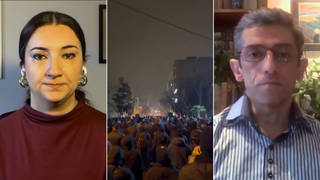
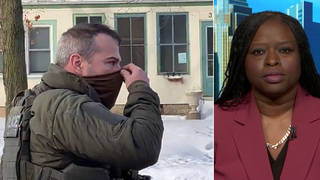
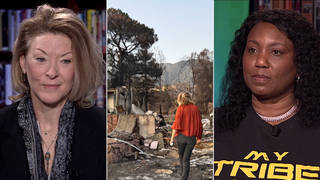
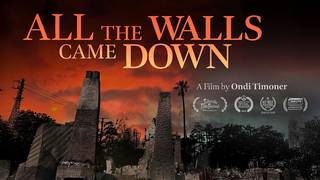
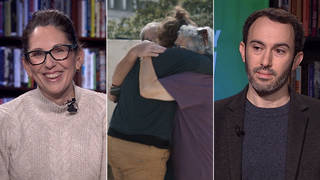
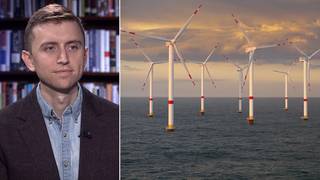
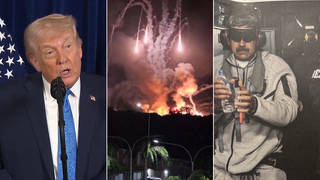

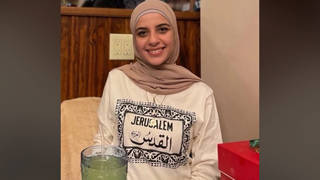

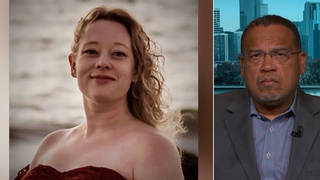
Media Options